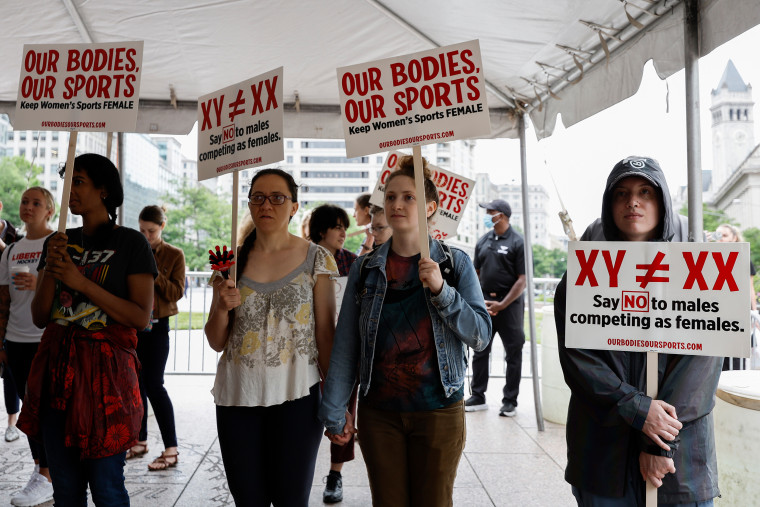More Americans than before oppose transgender athletes competing in sports that align with their gender identity and say transitioning genders is “morally wrong,” according to a report from Gallup released Monday.
The survey — conducted from May 1 to May 24 via telephone interviews with roughly 1,000 adults living in the U.S. — found that 69% of people say that transgender athletes should only be allowed to compete on sports teams that correspond with the sex they were assigned at birth, compared with 62% in 2021. It also shows that a slightly higher share of Americans, 55%, consider “changing one’s gender” to be more “morally wrong” than in 2021, when it was 51%.
Gallup’s findings come amid an unprecedented number of anti-LGBTQ bills, 491, introduced by conservative lawmakers in state legislatures across the country, according to the American Civil Liberties Union, with the majority of the legislation affecting trans Americans.
“The attacks on trans people have been very acute and vicious,” Alejandra Caraballo, a trans activist and clinical instructor at Harvard Law School’s Cyberlaw Clinic, said. “It’s basically been the only thing that the far-right talks about so it’s not surprising that, in light of all of these concentrated attacks against trans people, that support has started to dip.”
Within the last handful of years, 22 states have enacted bills that would restrict trans athletes from competing on sports teams that correspond with their gender identities, and 20 states have enacted measures to restrict transition-related health care, according to Movement Advancement Project, an LGBTQ think tank.
Supporters of the legislation argue that trans athletes — specifically trans girls and women — have unfair competitive advantages in sports, and that it is necessary to protect children from making transition-related decisions they may later regret. Critics say that the measures are discriminatory and pose a particular risk to trans youths, who suffer from disproportionate rates of suicidal ideation.
A majority of the nation’s top medical associations in the U.S. — including the American Medical Association, the American Academy of Pediatrics and the American Psychological Association — oppose legislation restricting transition-related care.
Josie Caballero, who is the director of the U.S. transgender survey and special projects at advocacy group the National Center for Transgender Equality, said that although Gallup’s data showed a short-term uptick in opposition to some trans freedoms, she is “hopeful” things will turn around in the coming years.
She pointed to long-term sentiments on same-sex marriage, which mirrored the current ebb and flow of trans rights throughout the early 2000s and 2010s. During that time, marriage equality was heavily debated at the state and federal level, until the Supreme Court legalized marriage equality nationwide in 2015.
Support for same-sex marriage has increased almost steadily since 2015, rising to an all-time-high of 71% last year, according to a separate report from Gallup released this month.
Caballero added that majority opposition to trans people competing in sports and people transitioning genders could be because the majority of Americans do not personally know a trans person.
Only 39% of Americans say they know someone who is trans, compared with 31% in 2021, according to the new poll. Those who know a trans person are more likely to say trans athletes should be able to play on a team of their gender identity versus those who don’t know a trans person — 30% compared with 23%.
“It’s natural for people to have questions when they’re learning something new,” Caballero said.
Caraballo and Caballero noted that the new data shows that future generations of policymakers are more likely to be in favor of trans people.
On the issue of trans inclusion in sports, young adults are also more supportive than other subgroups and are one of the only subgroups whose support has grown since 2021, with 41% of them in favor now versus 35% in 2021. And 60% of 18- to 29-year-olds say changing one’s gender is morally acceptable, compared with less than a third of Americans over the age of 50.
“They’re the ones playing trans people,” Caballero said, referring to competing in sports. “They’re the ones in college, in school, and they’re the most accepting of all.”
If you or someone you know is in crisis, call 988 to reach the Suicide and Crisis Lifeline. You can also call the network, previously known as the National Suicide Prevention Lifeline, at 800-273-8255, text HOME to 741741 or visit SpeakingOfSuicide.com/resources for additional resources.

